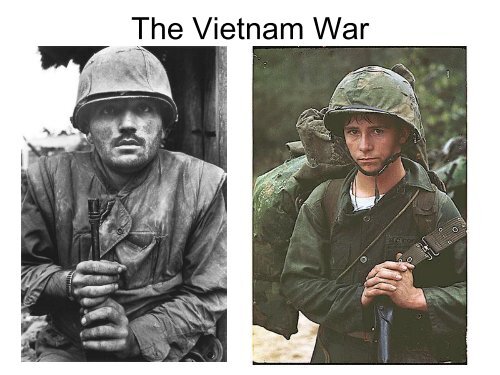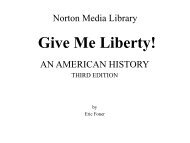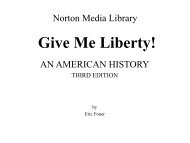The Vietnam War.pdf - KenyonUSHistory
The Vietnam War.pdf - KenyonUSHistory
The Vietnam War.pdf - KenyonUSHistory
You also want an ePaper? Increase the reach of your titles
YUMPU automatically turns print PDFs into web optimized ePapers that Google loves.
<strong>The</strong> <strong>Vietnam</strong> <strong>War</strong>
1. Under whose Presidency did the US become<br />
involved in <strong>Vietnam</strong>?<br />
2. What was the Historical SignificANCE OF Dien<br />
Bien Phu?<br />
3. Who was Ho Chi Minh and what was the Ho<br />
Chi Minh Trail?<br />
4. What was the Gulf of Tonkin Resolution?<br />
5. What was operation Rolling Thunder?<br />
6. What is Agent Orange?<br />
7. What is the historical significance of the Tet<br />
Offensive<br />
8. What is <strong>Vietnam</strong>ization?
French Indochina<br />
• By 1500’s the French come to <strong>Vietnam</strong> in<br />
search of spices.<br />
• Attempt to convert the <strong>Vietnam</strong>ese to<br />
Catholicism.<br />
• Several missionaries are murdered which<br />
prompts France to send it’s navy for<br />
protection.<br />
• France takes control of all Indochina<br />
(<strong>Vietnam</strong>, Loas, and Cambodia)
Maps of Indochina: Laos,<br />
Cambodia, and <strong>Vietnam</strong>
French Indochina<br />
• <strong>Vietnam</strong>ese come to hate French<br />
imperialism.<br />
• Most <strong>Vietnam</strong>ese are Peasant Farmers,<br />
the French want to make profits so they<br />
turn the land into giant plantations and turn<br />
the <strong>Vietnam</strong>ese into tenant farmers.<br />
• This means great profits for the French<br />
and great hardships for most of <strong>Vietnam</strong>.
French restrict freedom of speech and assembly.<br />
French Jailed several <strong>Vietnam</strong>ese Nationalists.<br />
All this does is make <strong>Vietnam</strong> more ripe for revolt.
Ho Chi Minh<br />
• <strong>Vietnam</strong>ese begin to<br />
rebel against French<br />
rule.<br />
• By 1940’s they are<br />
ready for full scale<br />
revolution.<br />
• <strong>The</strong> most important<br />
leader is Ho Chi Minh.<br />
• Wanted Independence<br />
for <strong>Vietnam</strong> and to turn<br />
it into a Communist<br />
country.
Ho forms the League for<br />
the Independence of<br />
<strong>Vietnam</strong> known as the<br />
VIETMINH.<br />
“Rich people, soldiers,<br />
workers, peasants,<br />
intellectuals, employees,<br />
traders, youth, and<br />
women who warmly love<br />
your country! Let us unite<br />
together! As one mind<br />
and strength we shall<br />
overthrow the Japanese<br />
and French.” –Ho
Ho receives help from the U.S. to defeat Japan<br />
during WWII.<br />
On September 2, 1945 a half a million <strong>Vietnam</strong>ese<br />
gather in Hanoi to celebrate their independence.<br />
American Planes circle overhead and the band plays the Star<br />
Spangled Banner.<br />
Ho Chi Minh reads a speech that was modeled after Thomas<br />
Jefferson’s Declaration of Independence.
Ho Chi Minh’s: Declaration of Independence,<br />
Democratic Republic of <strong>Vietnam</strong><br />
“All men are created equal. <strong>The</strong>y are endowed by their Creator with<br />
certain inalienable rights, among these are Life, Liberty, and the<br />
pursuit of Happiness"<br />
This immortal statement was made in the Declaration of Independence<br />
of the United States of America m 1776. In a broader sense, this<br />
means: All the peoples on the earth are equal from birth, all the<br />
peoples have a right to live, to be happy and free.<br />
<strong>The</strong> Declaration of the French Revolution made in 1791 on the Rights<br />
of Man and the Citizen also states: "All men are born free and with<br />
equal rights, and must always remain free and have equal rights."<br />
Those are undeniable truths.<br />
Nevertheless, for more than eighty years, the French imperialists,<br />
abusing the standard of Liberty, Equality, and Fraternity, have<br />
violated our Fatherland and oppressed our fellow-citizens. <strong>The</strong>y<br />
have acted contrary to the ideals of humanity and justice. In the field<br />
of politics, they have deprived our people of every democratic<br />
liberty.
Fear of Communism<br />
• <strong>The</strong> Soviets dominated most of Eastern Europe.<br />
• <strong>The</strong> Chinese communist were fighting for control<br />
of China.<br />
• Truman fears the spread of communism and for<br />
containment purposes supports the French in<br />
their efforts to retake control of <strong>Vietnam</strong>.<br />
• French soldiers enter <strong>Vietnam</strong> and retake<br />
control, sending the Vietminh into the jungle to<br />
prepare for another guerrilla war.
“If ever the tiger<br />
pauses, the<br />
elephant (France)<br />
will impale him on<br />
his mighty tusks.<br />
But the tiger will<br />
not pause, and<br />
the elephant will<br />
die of exhaustion<br />
and loss of<br />
blood.”
1950: U.S. enters the struggle<br />
between France and <strong>Vietnam</strong>.<br />
Over the next four years the<br />
U.S. spends 2.6 Billion on the<br />
war.
In 1953 newly elected President Dwight D. Eisenhower continues sending<br />
money to help the French in <strong>Vietnam</strong> and introduces the Domino <strong>The</strong>ory.<br />
Compares countries on the brink of Communism to a row of Dominoes, waiting<br />
to fall one after the other. “You have a row of dominoes set up, You knock<br />
over the first one, and what will happen to the last one is the certainty that<br />
it will go over very quickly.”
Dien Bien Phu<br />
• Despite Massive U.S. aid, the French<br />
could not retake <strong>Vietnam</strong>.<br />
• May 1954 is the final blow when the<br />
Vietminh overran the French outpost at<br />
Dien Bien Phu.
Dien Bien Phu<br />
A French military base that<br />
the Vietminh gain control of,<br />
French surrender and begin<br />
to pull out of <strong>Vietnam</strong>.
• After fall of Dien Bien Phu,<br />
French surrender and begin to<br />
pull out of <strong>Vietnam</strong>.<br />
• May- July 1954: France, Great<br />
Britain, Soviet Union, United<br />
States, China, Laos, and<br />
Cambodia meet in Geneva<br />
Switzerland with the Vietminh<br />
and the anti-communist<br />
nationalists from the South.<br />
Chinese Premier Zhou Enlai(left) with <strong>Vietnam</strong>ese President<br />
Ho Chi Minh (center), Premier Pham Van Dong and Vice-<br />
Premier Ho Lung.<br />
• Geneva Accords: temporarily<br />
divides <strong>Vietnam</strong> along the 17 th<br />
parallel. Communist leader Ho<br />
Chi Minh control the North from<br />
city of Hanoi. While anticommunist<br />
nationalists<br />
controlled the South from the<br />
city of Saigon
• Geneva Accords: temporarily<br />
divides <strong>Vietnam</strong> along the 17 th<br />
parallel. Communist leader Ho<br />
Chi Minh control the North from<br />
city of Hanoi. While anticommunist<br />
nationalists controlled<br />
the South from the city of Saigon
Ho Chi Minh in the North<br />
• Ho’s government was brutal and<br />
repressive.<br />
• Wins popular support in the North by<br />
breaking up large plantations and<br />
redistributing the land to the peasants.<br />
• By fighting off the Japanese and the French<br />
in the name of an independent <strong>Vietnam</strong> he<br />
had become a national hero.
Ngo Dinh Diem<br />
• Ngo Dinh Diem:<br />
President of South<br />
and strong anticommunist.<br />
• He realizes Ho’s<br />
popularity and refuses<br />
to take part in the<br />
countrywide election<br />
of 1956.
Ike and Diem<br />
• U.S. thinks that if there<br />
is a countrywide election<br />
that Ho will win so they<br />
support the cancellation<br />
of the elections.<br />
• Furthermore, they will<br />
give military aid and<br />
training to Diem in return<br />
for a stable anticommunist<br />
government<br />
in the South.
Diem Fails the U.S.<br />
• He leads a corrupt government.<br />
• He violently suppresses any<br />
opposition.<br />
• Offered little or no land<br />
distribution to the peasants.<br />
• Restricts Buddhist religious<br />
practices.
Vietcong (VC)<br />
• 1957 Vietcong (Vietminh)<br />
begin attacks on Diem<br />
government<br />
assassinating thousands<br />
of govt. officials.<br />
• Ho Chi Minh Trail: Ho<br />
supplies the VC with w/<br />
weapons via a network of<br />
paths along the borders<br />
of <strong>Vietnam</strong>, Laos, and<br />
Cambodia
John Kennedy and <strong>Vietnam</strong><br />
• Kennedy was fearful<br />
of attacks that<br />
Democrats were soft<br />
on communism.<br />
1. Increases Financial<br />
Aid to Diem<br />
2. Sends thousands of<br />
military advisors to<br />
train the S.<br />
<strong>Vietnam</strong>ese troops.
• Diems popularity<br />
continues to fall.<br />
• Strategic Hamlet<br />
Program: Moves all<br />
villagers into protected<br />
areas.<br />
• This greatly upsets<br />
villagers who had seen<br />
no land reform from<br />
Diem and were now<br />
being forced to leave<br />
their home villages<br />
were their families had<br />
lived for generations<br />
and where their<br />
ancestors were buried.
Further Attacks on Buddhism<br />
• Fed up with Buddhist protests against his<br />
regime Diem imprisons imprisons<br />
thousands of Buddhist clerics and orders<br />
their temples destroyed.<br />
• Several monks and nuns publicly burn<br />
themselves to death.<br />
• American officials ask Diem to stop the<br />
persecution but he refuses.
Diem Must Go<br />
• On November 1, 1963 a U.S.<br />
supported military coup toppled Diems<br />
regime.<br />
• Against Kennedy’s wishes Diem is<br />
executed.<br />
• A few weeks later Kennedy is<br />
assassinated and the question of<br />
<strong>Vietnam</strong> falls to the New President<br />
Lyndon B. Johnson
After Diem<br />
• After Diem’s death S. <strong>Vietnam</strong> is in Chaos.<br />
• Military leaders try to grab power.<br />
• Vietcong only getting stronger.<br />
• New U.S. President Lyndon B. Johnson<br />
does not want to<br />
be labeled soft on<br />
communism.
<strong>The</strong> Tonkin Gulf Resolution<br />
• August 2, 1964: N. <strong>Vietnam</strong>ese patrol<br />
boat fires a torpedo at an American<br />
destroyer the U.S.S. Maddox which<br />
was in the Gulf of Tonkin off the N.<br />
<strong>Vietnam</strong>ese Coast.<br />
• Torpedo missed it’s target – But the<br />
Maddox inflicts heavy damage on the<br />
patrol boat.
2 Days Later…<br />
• Maddox and another Destroyer are sailing<br />
of the coast of N. <strong>Vietnam</strong>.<br />
• Technicians report that they were shot at<br />
by enemy torpedoes.<br />
• <strong>The</strong> Maddox opens fire.<br />
• Crew later said they had neither seen nor<br />
heard hostile gunfire.
LBJ’s Response<br />
• Launches<br />
bombing<br />
strikes on N.<br />
<strong>Vietnam</strong><br />
• Asks congress<br />
for “all<br />
necessary<br />
powers”
<strong>The</strong> Tonkin Gulf Resolution<br />
• Congress approves Johnson’s request called the<br />
Tonkin Gulf Resolution on August 7, 1964.<br />
• It gives him broad military powers in <strong>Vietnam</strong>.<br />
• LBJ does not tell congress or the American people<br />
that the U.S. had been leading secret raids against<br />
N. <strong>Vietnam</strong> or that the Maddox was in Gulf of<br />
Tonkin to gather info for the raids.<br />
• LBJ had prepared the resolution months<br />
beforehand and was just waiting for the right<br />
moment to pass it through congress.<br />
• 2005 National Security Advisory released secret<br />
documents that made it clear no attack had<br />
occurred
Tonkin Gulf Resolution gives LBJ the authority<br />
to use military power against N. <strong>Vietnam</strong>
Operation Rolling Thunder<br />
• February of 1965: <strong>The</strong><br />
first sustained bombing<br />
N. <strong>Vietnam</strong>. (3/1965 –<br />
11/1968<br />
• By June More than<br />
50,000 U.S. soldiers<br />
were battling the<br />
Vietcong.<br />
• Much of the nation<br />
supported Johnson and<br />
the containment of<br />
Communism in<br />
<strong>Vietnam</strong>.<br />
• Wins 1964 Presidential<br />
Election.
Rolling Thunder<br />
2 March 1965 until 1 November 1968<br />
(More tonnage then all sides on WWII)
LBJ Reluctant to Send Ground Troops<br />
• Said he was, “not<br />
about to send<br />
American boys 9<br />
or 10,000 miles<br />
away from home<br />
to do what Asian<br />
boys ought to be<br />
doing for<br />
themselves.”
In March of 1965 after advising<br />
closely with Secretary of Defense<br />
Robert McNamara and Secretary of<br />
State Dean Rusk he begins sending<br />
tens of thousands of U.S. soldiers to<br />
<strong>Vietnam</strong>.
Sec. Of Defense: Robert McNamara<br />
Sec. Of State: Dean Rusk
Escalation<br />
• August 7, 1964: Congress gives LBJ war<br />
powers on<br />
• June 1965: More than 50,000 U.S. soldiers were<br />
battling the Vietcong.<br />
• By the end of 1965: U.S. had sent more than<br />
180,000 Americans to <strong>Vietnam</strong><br />
• 1965 poll showed 61% of Americans<br />
supported the U.S. policy in <strong>Vietnam</strong>,<br />
while only 24% opposed it.<br />
• By 1967: the number of U.S. troops in<br />
<strong>Vietnam</strong> is 500,000.
• 1965 poll showed 61% of<br />
Americans supported the U.S.<br />
policy in <strong>Vietnam</strong>, while only 24%<br />
opposed it.<br />
• By the end of 1965 U.S. had sent<br />
more than 180,000 Americans to<br />
<strong>Vietnam</strong>
• ARVN: Army of the Republic of<br />
<strong>Vietnam</strong><br />
VC: Ho’s Guerilla army that fights<br />
against U.S.<br />
• Gen. William Westmoreland:<br />
<strong>The</strong> American Commander in S.<br />
<strong>Vietnam</strong> who continues to request<br />
more troops.<br />
• Westmoreland had no trust in the<br />
ARVN.<br />
• By 1967 the number of U.S.<br />
troops in <strong>Vietnam</strong> is 500,000.
JUNGLE WARFARE<br />
• Jungle terrain and enemy’s guerilla tactics<br />
turned the war into a frustrating stalemate.<br />
• Vietcong lacks high powered weaponry of<br />
U.S. forces.<br />
• VC: use hit and run, ambush tactics, and<br />
knowledge of the jungle to confuse the<br />
U.S.<br />
• Jungles were laced with booby traps and<br />
land mines.<br />
• VC used a system of tunnels to attack and<br />
disappear quickly.
Blending In<br />
• Attacks could happen in cities or in the<br />
countryside.<br />
• Vietcong moved secretly in and out of the<br />
civilian population making it hard for U.S.<br />
soldiers to tell who was friend and who<br />
was the enemy.
A South <strong>Vietnam</strong>ese<br />
soldier beats a farmer<br />
with the blunt end of a<br />
knife for allegedly<br />
supplying inaccurate<br />
information about the<br />
movement of Viet Cong<br />
guerrillas in a village<br />
west of Saigon. Jan. 9,<br />
1964.
<strong>The</strong> body of an American paratrooper killed<br />
in action near the Cambodian border is<br />
raised to an evacuation helicopter in<br />
<strong>Vietnam</strong> in 1966. More than 58,000<br />
Americans were killed and 350,000<br />
wounded in the war.
A South <strong>Vietnam</strong>ese woman mourns over the body of her husband,<br />
found with 47 others in a mass grave near Hue in April 1969.
Veterans of the <strong>Vietnam</strong> conflict<br />
take part in an anti-war protest<br />
by piling their medals,<br />
decorations and awards in front<br />
of the U.S. Capitol on April 26,<br />
1971. A veteran adds his<br />
helmet to the pile.





